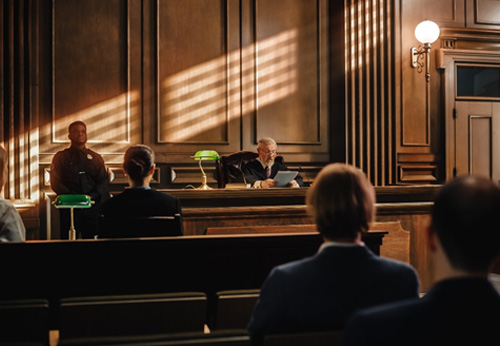 When it comes down to it, civil litigation is a fancy term for the process of resolving disputes between private individuals. A person who commits a crime will find themselves prosecuted by the state or federal government, but civil litigation refers to cases where there is a non-criminal dispute between private individuals – typically over money, property, or who has the right to do what.
When it comes down to it, civil litigation is a fancy term for the process of resolving disputes between private individuals. A person who commits a crime will find themselves prosecuted by the state or federal government, but civil litigation refers to cases where there is a non-criminal dispute between private individuals – typically over money, property, or who has the right to do what.
Civil litigation does not include cases where a defendant is executed or sent to prison. These are cases where a business deal has gone wrong or where individuals have such opposing views that they need the law to intercede in order to resolve the issue at hand.
For example, a very common dispute occurs when two parties enter into a contract and one person thinks that the other person hasn’t fulfilled their end of the deal. This often happens in instances where one party fails to build something completely, or when someone fails to pay a bill. Consequently, there’s a dispute as to who is in the right and who is in the wrong.
Individuals can also have disputes over who owns something. This could include disputes about real estate, such as where a property line is, or who is the true owner of any piece of property. Civil disputes can arise around anything a person can own. A car, a boat, an RV, a tractor-trailer – even pets and farm animals can be the subject of a civil dispute.
It should be noted our civil litigation firm doesn’t focus on handling family-based civil litigation like child custody cases or divorce. But although we don’t handle family law cases, the matters that we see are sometimes not all that different from the kinds of things people resolve in family court.
Civil lawsuits take all shapes and sizes, and they can include parties who know each other as well as family – or even actual family members themselves. The reality is, at some time or another, anyone can get into a civil lawsuit to resolve issues over who owns something or who has the right to be somewhere.
A Common Misconception About Case Results
Of course, we can handle any sort of dispute over property, money, or legal rights, but we can’t fix a relationship or give a person emotional peace. Such things are beyond our ability as a law firm. If your business relationship sours, we can help you protect your rights and get any money or property that’s owed to you. What we can’t do is make the other person stop behaving offensively or make you feel better about that person’s offensive behavior.
What’s more, you have to remember that not every case ends in a decision about who is right and who is wrong. Not every case resolves through one party getting everything they want while the other side gets nothing of what they want. In reality, most cases are resolved through a settlement, which is a negotiated agreement. One side may be happier with the settlement than the other side is – but often, civil cases end in a form of compromise rather than a win-lose decision.
Some Of The Initial Questions & Considerations That Determine Whether Your Case Is Viable
Every case starts with hearing your side of the story. In your initial consultation, we’ll work to understand the scope of your situation. So the first few questions will usually include:
- What happened to you?
- What’s wrong?
- Who’s responsible for what’s wrong?
- What is the problem you have with what happened?
- And more…
The answers to these questions provide us with a thorough understanding of what happened to you and what your side of the story is. Perhaps you might tell me that you got a letter from a lawyer representing a person who is accusing you of this, that, or the other. In this case, one of my first questions would be, “May I see that contract?”, “May I see that letter?”, or “May I see that text exchange or that email?” As the first step, we need to see whatever documentation is available that details the start of the dispute.
We also look at every form of evidence. This can consist of people’s oral testimony, events that they’re talking about from memory, or conversations that they had. These items can then be supported with written evidence, documents, or communications. While both can be critical to a case, we live in an age where many things are put into writing one way or another – which is helpful as a single piece of writing is stronger evidence than your memories of a conversation that happened a year ago. A piece of writing like a contract or a critical communication could end up being central to the case.
With the guidance of a skilled attorney for Civil Law Cases, you can have the peace of mind that comes with knowing that we’ll make it look easy.
For more information on Civil Law in Wisconsin, an initial consultation is your next best step. Get the information and legal answers you are seeking by calling (920) 759-8114 today.

If You Have More Questions About Your Case.
Call Wick Today (920) 759-8114